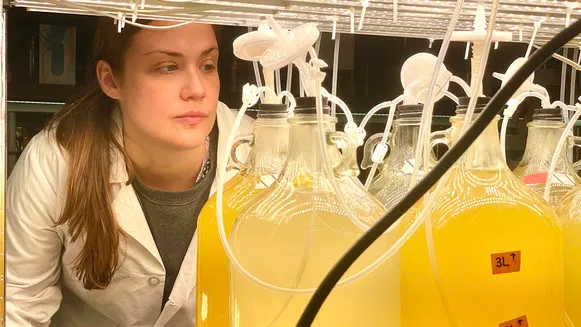
In 2024, 4 Corners awarded $175,000 in catalytic funding to Minus Materials, a Boulder, Colorado-based company pioneering a bio-based approach to decarbonizing concrete. Founded in 2021, by Sarah Williams, Ph.D and Wil V. Srubar III, Ph.D., Minus Materials is on a mission to transform one of the most carbon-intensive industries—cement production—by replacing quarried limestone with their innovative BioPCC, a high-performance, sustainable alternative made from microalgae.
Minus Materials' groundbreaking process leverages calcareous microalgae to grow carbon-negative, biorenewable limestone. Through biological direct air capture (DAC), the algae convert atmospheric CO2 into organic biomass and limestone (CaCO3) via biomineralization. Their pilot project in Boulder County, a first-of-its-kind regenerative quarry, has the capacity to remove 1.8 kg of CO2 per 1 kg of organic biomass and yield approximately 100 kg of biorenewable limestone over it’s first year. This approach reduces dependence on traditional quarrying, preserving biodiversity and natural resources while creating a renewable, CO2-negative material.
The impact of this innovation is immense. Portland cement production accounts for more than 8% of global CO2 emissions. Minus Materials’ BioPCC can be seamlessly integrated into the existing cement manufacturing process, reducing CO2 emissions by 60% without requiring changes to infrastructure. The carbon-negative limestone can be used in Portland limestone cement (PLC) or limestone calcined clay (LC3) concrete slabs, providing a durable form of carbon storage.
With the support of 4 Corners, Minus Materials is launching a demonstration project to integrate its BioPCC filler into Portland cement. The company has also secured partnerships with Cemex Lyons Plant to test their product and Carbon Leadership Forum to conduct a rigorous third-party Life Cycle Assessment (LCA) of their product. Additional funding from SOSV and Breakthrough Energy Foundation further emphasizes the increasing confidence in Minus Materials' potential.
Beyond cement, BioPCC opens new opportunities for decarbonization across industries that rely heavily on calcium carbonate, such as personal care products, paper and cardboard, composites, adhesives, sealants, and paints.
Looking to 2030, the company aims to capture 4.4 million tons of CO2e per year, producing 10 million tons of renewable limestone annually. As Minus Materials continues to scale, their work offers a promising pathway to reducing industrial carbon emissions while preserving natural ecosystems.
“Without the support of the 4 Corners catalytic funding, this first-of-its-kind regenerative quarry pilot would not be possible,” says the Minus Materials team. With this crucial backing, and leveraging one of nature’s most effective carbon sinks—limestone—Minus Materials is redefining sustainable material production.